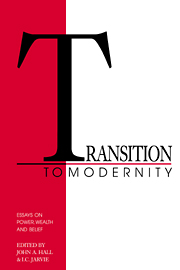Book contents
- Frontmatter
- Contents
- List of illustrations
- List of contributors
- Introduction
- PART I THE PRE-MODERN WORLD
- PART II TRANSITIONS TO THE MODERN WORLD
- 4 On a little known chapter of Mediterranean history
- 5 Ernest Gellner and the escape to modernity
- 6 The emergence of modern European nationalism
- 7 Sovereign individuals
- PART III MODERNITY AND ITS DISCONTENTS
- Indexes
5 - Ernest Gellner and the escape to modernity
Published online by Cambridge University Press: 02 February 2010
- Frontmatter
- Contents
- List of illustrations
- List of contributors
- Introduction
- PART I THE PRE-MODERN WORLD
- PART II TRANSITIONS TO THE MODERN WORLD
- 4 On a little known chapter of Mediterranean history
- 5 Ernest Gellner and the escape to modernity
- 6 The emergence of modern European nationalism
- 7 Sovereign individuals
- PART III MODERNITY AND ITS DISCONTENTS
- Indexes
Summary
Ernest Gellner is in the great tradition of European thinkers. Poised between social systems, he is compelled to analyse the chasms that he straddles. Few writers in this century have been better placed to see and explain the peculiarities of modern industrial-capitalist civilisation.
The early clash between eastern and western Europe in his upbringing has been reinforced by at least three further intellectual and social experiences which have heightened his awareness of the peculiarities and precariousness of our civilisation. One of these is his professional interest in the great philosophical watershed between the ancien régimeand modernity which took place in the eighteenth century and particularly in the Scotland of his beloved David Hume. Here Gellner finds a specification of the foundation of the new world and all its strangeness, which was given further precision by his other mentor, Kant.
The second reinforcement comes from his professional involvement with Islam. This provides him with an invaluable counter-model. He approvingly quotes De Tocqueville on the fact that ‘Islam is the religion which has most completely confounded and intermixed the two powers … so that all the acts of civil and political life are regulated more or less by religious law’. Islam makes Gellner deeply aware that the mixing of religion and politics is the normal state of mankind; their separation is a recent peculiarity.
Thirdly, there is Gellner's continuing work with the only other major ‘totalitarian’ or ‘closed’ system that still exists, communism. Whereas Islam embeds politics within religion, the Soviet world where Gellner has worked tries to embed economy, society and religion within the polity.
- Type
- Chapter
- Information
- Transition to ModernityEssays on Power, Wealth and Belief, pp. 121 - 136Publisher: Cambridge University PressPrint publication year: 1992
- 3
- Cited by

